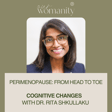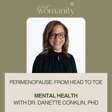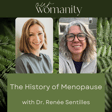
9. Perimenopause: Gynecology with Dr. Sameena Rahman
This episode of Perimenopause: Head to Toe features Dr. Sameena Rahman, an OB-GYN and specialist in sexual medicine and menopause. She is also the founder of the GYN and Sexual Medicine Collective
Dr. Rahman highlights that women in their mid-40s often experience confusing bodily changes. Symptoms include:
- Menstrual Changes: Unpredictable periods, with some becoming heavier or stopping for months.
- Physical & Emotional Symptoms: Intimate dryness, reduced libido, sleep issues, hot flashes, brain fog, and irritability.
Systemic Issues in Women's Healthcare
The conversation addresses challenges within the medical system.
- A Patriarchal System: The doctors agree that the healthcare system is historically patriarchal, resulting in a lack of research and understanding of women's health.
- Medical Training Gap: The doctors note that medical school training often overlooks the significant emotional and cognitive effects of perimenopause, focusing instead on hot flashes and irregular periods.
- The "Double Whammy": They point out that because the OB-GYN field is largely female, there's an unspoken expectation to manage all aspects of women's health with limited resources, leading to provider burnout and inadequate patient care.
Cultural Differences and Bias
Dr. Rahman, who is South Asian, discusses unique challenges for women of color.
- Earlier Onset: Women of color, including Black and South Asian women, often experience perimenopause and menopause earlier. This is linked to allostatic load, the cumulative "wear and tear" from chronic stress.
- Stigma: Cultural factors like stoicism and taboos around sex lead to a reluctance to seek medical help.
- Health Disparities: The episode notes higher rates of heart disease and diabetes in the South Asian population.
About Dr. Rahman’s Practice and Book
Dr. Sameena Rahman is a board-certified OB/GYN, sex-med gynecologist, menopause specialist and a clinical assistant professor of OB/GYN at the Northwestern Feinberg School of Medicine. She is the founder of the Gyn & Sexual Medicine Collective, a successful concierge practice that emphasizes evidence-based medicine and an affiliate of Ms. Medicine. Dr. Rahman is dedicated to evaluating and treating each patient with compassion, trauma-informed care, and an awareness of personal bias. Additionally, she hosts the podcast Gyno Girl Presents: Sex, Drugs & Hormones.
Her upcoming book, "Brown Girls Disease? A Guide to Sexual Health and Empowerment Through a South Asian Lens," explores sexual health issues from a unique cultural and religious perspective.



















